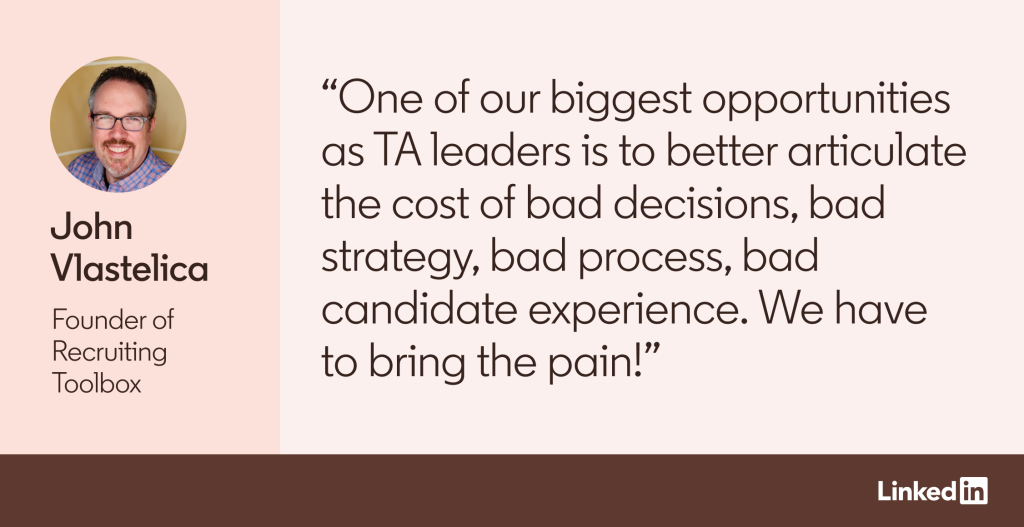Two-thirds of global leaders have experienced a labor shortage in the past 12 months, according to recent research from Randstad. Factors like low unemployment rates, an aging workforce, and growing skills gaps are making it harder for many organizations to attract the talent they need. But that doesn’t necessarily mean that supply outstrips demand.
In reality, many candidates have the right skills, even for highly specialized positions, but are inadvertently passed over by hiring teams because their educational background and prior work history look unfamiliar. One such group is refugees, with 80% of hiring managers agreeing that they have the right skills. By adjusting your hiring process to shine a spotlight on candidates’ skills, you can tap into this overlooked talent pool — while helping refugees rebuild their lives.
Three organizations that have done just that are NewYork-Presbyterian, The Royal Marsden NHS Foundation Trust, and the German division of Cisco. From hiring skilled IT professionals to nurses and other clinically trained staff, here’s how these employers connected the dots between refugee talent and opportunity by taking a skills-based approach.
NewYork-Presbyterian reframes “overqualified” as an opportunity to hire skilled, compassionate employees
Relaunching your career in a new country can be a challenge for anyone, but it’s especially difficult for professionals working in the highly regulated healthcare industry, who may need to return to medical school if they want to pick up where they left off. In the U.S., for instance, almost all international medical graduates are required to complete a residency program before gaining a license to practice — a process that takes a minimum of three years.
For refugees who may not yet have a stable place to live or the means to support their families, this is rarely a viable option, at least right away. But with a medical degree under their belt, they also risk being labeled “overqualified” if they apply for roles within the healthcare industry that don’t require one.
NewYork-Presbyterian was keenly aware of these discrepancies. With 11 hospitals and over 70 medical group locations across New York City and Westchester County, NewYork-Presbyterian has extensive staffing needs amid a nationwide healthcare worker shortage. These needs were pushed to the limit during the pandemic, forcing leaders to think outside the box.
In 2021, on the advice of a board member, NewYork-Presbyterian was introduced to the nonprofit Upwardly Global for help in sourcing clinically trained refugees who could support vaccine rollout efforts. The organization had hired skilled refugees, asylum seekers, and other skills-aligned candidates from migrant backgrounds before on an ad hoc basis. But after seeing how well refugees performed in registrar positions, the organization was inspired to create a formal refugee hiring program to help fill other non-physician roles — from medical assistants to nursing attendants to grants writers — at its hospitals.
To minimize unconscious bias, NewYork-Presbyterian educated its hiring managers to understand why a candidate from a refugee background might seem overqualified and shared success stories from other departments that had already begun working with refugee talent. The hospital also works with candidates to identify other acceptable forms of verification if it’s impossible for them to acquire references from their home country.
Many refugees hired at NewYork-Presbyterian start out in “returnships” that function like midcareer internships, allowing them to gain experience working in a U.S. healthcare setting while they decide where they want to apply their skills in the long term. Many later accept permanent positions on the team, while others decide to return to medical school or choose to reskill into another clinical profession.
This approach allows NewYork-Presbyterian to address short-term staffing needs and creates a pipeline of talent for future roles. What’s more, far from being “overqualified,” employees from refugee backgrounds are eager to apply their skills in their new roles — providing knowledgeable, compassionate care.
“Their prior experience allows them to bring empathy and soft skills that are so important in assisting patients and families,” says Elyse Zlotnikov, director of talent acquisition at NewYork-Presbyterian. “The feedback we’ve received from their managers and colleagues has been incredible.”
Cisco Germany has rethought degree requirements and engages employees as talent scouts
The technology industry may not face the same regulatory challenges as healthcare, but that doesn’t make its staffing shortage feel any less acute to the hiring managers navigating it. In Germany alone, almost 150,000 IT jobs are currently vacant due to a shortage of skilled workers, with German economy minister Robert Habeck recently acknowledging that migration may be essential for bridging workforce gaps.
Cisco is way ahead of him. In 2015, at a time when Germany was welcoming an unprecedented number of displaced people with open arms, the German division of the global technology company partnered with the nonprofit ReDI School of Digital Integration to make its free learning platform, Cisco Networking Academy, accessible to more refugees. Inspired by this partnership, Oliver Tuszik, Cisco’s then-country manager for Germany, pledged to create 20 internship positions for refugees.
This decision quickly led Cisco to discover a barrier that was preventing many candidates trained in other regions from applying: the requirement of a bachelor’s degree, even for roles that could be performed without one. As a result, Cisco has increased its focus on describing the core competencies required for a role to help candidates determine if it’s the right fit for their skills.
“We have a skills gap,” explains Carsten Johnson, CSR territory manager at Cisco. “Employers are learning more and more that they have to take into account people who, from an old perspective, may not 100% match from a resume perspective — but who 100% match regarding the attitude, the motivation, and the eagerness to learn and work.”
Another discovery proved even more surprising. A 2020 report published by German internet trade association eco found that just 16.8% of tech specialists in Germany are women. Cisco itself has found that only around 9% of Networking Academy users in the country are women. Yet despite prevailing Western perceptions of women’s participation in the workforce in the Middle East, that number is closer to 40% in the Gulf region. As a result of this gender diversity within refugee talent pools, Cisco has found it easier to bring more women IT professionals on board.
What started as an extension of its corporate social responsibility (CSR) efforts has grown into a strategic talent play for Cisco. Many of the refugees brought in through the initial internship program remain at the company to this day. Working with these skilled and hard-working professionals has also inspired other employees to volunteer as trainers and mentors at ReDI School, where they frequently identify high-potential talent with in-demand skills that they can refer for open roles.
The Royal Marsden NHS Foundation Trust looks beyond past experience alone
In March 2024, the vacancy rate within the registered nursing staffing group in England was 7.5%. To put that in context, that’s over 31,000 nurse, midwife, and health visitor roles sitting unfilled — a shortfall that will inevitably have an impact on care.
As a specialist cancer center, The Royal Marsden NHS Foundation Trust makes providing compassionate, attentive patient care paramount. Operating in the multicultural city of London, the The Royal Marsden hospitals have always been open to welcoming skilled nursing talent from outside of the U.K. This ensures patients navigating a cancer diagnosis have all the support they could possibly need. But prior to 2022, the hospitals didn’t have any experience hiring refugees.
That changed when The Royal Marsden joined a program organized by NHS England and nonprofit Talent Beyond Boundaries. In March 2022, The Royal Marsden welcomed its first six Palestinian refugee nurses, with an additional four arriving the following summer.
Initially, the team was unsure where to place these nurses. While they were highly trained, they also lacked experience working directly with cancer patients, which the hospitals often looked for in new hires. Instead, the hiring team aimed to look at the whole person, rather than just their clinical experience, to identify the wards where they could best apply their skills.
This was complicated by the fact that many of the nurses didn’t speak fluent English when they first arrived. The Royal Marsden quickly learned to simplify its interview questions and later brought in an interpreter — the brother-in-law of a team member — to help put candidates at ease. Once they were placed in roles where they were communicating with patients and other staff on a daily basis, the nurses’ English skills accelerated rapidly.
What they lacked in direct cancer experience the refugees more than made up for in critical soft skills like compassion and empathy. They have also helped other staff to better understand the needs of patients and families from different cultures, empowering better patient care across the board. And after initially being placed in support roles while they gained their Nursing & Midwifery Council registration to practice in the U.K., nurses from both cohorts have gone on to build strong careers at the hospitals — becoming key members of The Royal Marsden family.
“You’re going to have staff who will stay,” says Peta Hicks, practice educator at The Royal Marsden, of hiring refugees via a skills-based approach. “You’re not going to have a retention problem because they feel part of it — they’re being valued for their skills.”
Final thoughts: Skills-based hiring can help you tap into overlooked talent pools
When refugees are forced to flee their homes, they’re also forced to leave the careers they’ve forged and start from square one in their new community. But they carry their skills with them.
Making small adjustments to your existing hiring processes can help you identify those skills — and tap into a large, diverse, and motivated pool of candidates that your competitors may be overlooking entirely.










